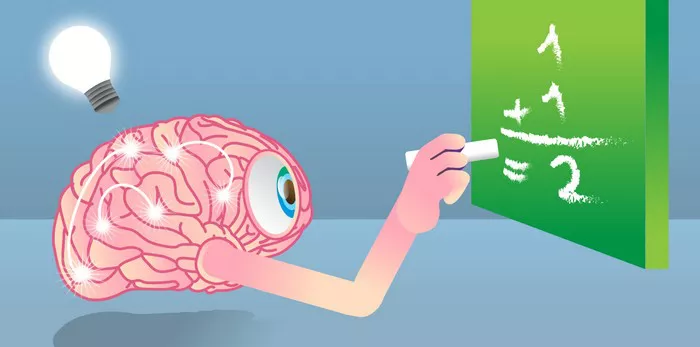Dyscalculia is a specific learning disability that affects an individual’s ability to understand and work with numbers. Often described as “math dyslexia,” dyscalculia can have a profound impact on daily life, affecting everything from academic performance to everyday activities involving numerical understanding. Recognizing the signs and symptoms of dyscalculia is crucial for seeking appropriate help and developing effective coping strategies. This article aims to provide a comprehensive overview of dyscalculia, including its symptoms, diagnostic criteria, and available support options.
What is Dyscalculia?
Dyscalculia is a learning disability characterized by difficulties in understanding, learning, and performing mathematical calculations. It is a neurological condition that impacts how individuals process numerical information. While dyscalculia can vary in severity, it generally affects a person’s ability to perform basic arithmetic operations, comprehend mathematical concepts, and apply these skills in everyday situations.
Prevalence and Impact
Dyscalculia is estimated to affect approximately 3-6% of the population, although the exact prevalence is difficult to determine due to variability in diagnostic criteria and awareness. The impact of dyscalculia can be extensive, influencing academic performance, career choices, and self-esteem. Individuals with dyscalculia may struggle with tasks that involve measurements, budgeting, and time management.
Identifying Symptoms of Dyscalculia
Recognizing the symptoms of dyscalculia is the first step toward obtaining a proper diagnosis and support. Symptoms can vary widely, but common indicators include:
1. Difficulty with Basic Math Skills
Individuals with dyscalculia often struggle with basic arithmetic operations such as addition, subtraction, multiplication, and division. They may find it challenging to memorize multiplication tables or perform calculations without a calculator.
2. Problems with Number Sense
A fundamental understanding of numbers and their relationships is crucial for mathematical reasoning. People with dyscalculia may have difficulty grasping concepts such as greater than, less than, or equal to. They may struggle to estimate quantities or make sense of numerical patterns.
3. Trouble with Math Word Problems
Math word problems require the ability to translate verbal information into mathematical equations. Individuals with dyscalculia may find it challenging to understand the problem, identify relevant information, and formulate the correct equation.
4. Difficulty with Spatial Awareness
Spatial awareness involves understanding and remembering the position of objects in space. People with dyscalculia may struggle with tasks that require spatial reasoning, such as reading maps, interpreting graphs, or organizing information.
5. Challenges with Time and Money Management
Dyscalculia can impact an individual’s ability to manage time and money effectively. This may include difficulties with scheduling, budgeting, and making change. People with dyscalculia may find it challenging to keep track of appointments or handle financial transactions.
6. Struggles with Mathematical Vocabulary
Understanding mathematical terminology is essential for grasping mathematical concepts. Individuals with dyscalculia may have difficulty with terms such as “fraction,” “percentage,” or “ratio.” This can hinder their ability to follow instructions or participate in math-related discussions.
7. Poor Performance in Math-Related Subjects
Students with dyscalculia may perform poorly in math-related subjects, even with adequate instruction and support. They may experience significant frustration and anxiety related to math tasks, which can affect their overall academic performance.
Diagnosing Dyscalculia
Diagnosing dyscalculia involves a comprehensive evaluation by a qualified professional, such as a psychologist or educational diagnostician. The diagnostic process typically includes:
1. Clinical Assessment
A clinical assessment involves a detailed evaluation of an individual’s cognitive and academic abilities. This may include standardized tests that measure mathematical reasoning, problem-solving skills, and numerical processing.
2. Educational History Review
A review of the individual’s educational history can provide insights into their mathematical performance over time. This may include analyzing report cards, standardized test scores, and any history of difficulties with math.
See Also: Can Dyscalculia Be Inherited: Things You Need To Know
3. Behavioral Observations
Observations of the individual’s behavior and performance in math-related tasks can offer valuable information. This may involve assessing their approach to problem-solving, time management, and use of mathematical strategies.
4. Rule Out Other Conditions
It is essential to rule out other conditions that may affect mathematical abilities, such as intellectual disabilities, sensory impairments, or emotional disturbances. A thorough evaluation helps ensure an accurate diagnosis and appropriate intervention.
Managing Dyscalculia
While dyscalculia is a lifelong condition, various strategies and accommodations can help individuals manage their symptoms and improve their mathematical skills. These may include:
1. Specialized Instruction
Specialized instruction from educators trained in working with students with learning disabilities can be highly beneficial. This may involve individualized or small-group instruction focused on building mathematical skills and strategies.
2. Assistive Technology
Assistive technology, such as calculators, math software, and visual aids, can support individuals with dyscalculia in performing mathematical tasks. These tools can help reduce the cognitive load associated with numerical processing.
3. Structured Practice
Regular and structured practice is essential for developing mathematical skills. Tailored practice sessions that focus on specific areas of difficulty can help reinforce learning and build confidence.
4. Memory Aids and Mnemonics
Memory aids and mnemonics can assist individuals in recalling mathematical facts and procedures. Techniques such as rhymes, acronyms, and visual imagery can make mathematical concepts more memorable.
5. Supportive Learning Environment
Creating a supportive learning environment that accommodates the needs of individuals with dyscalculia can enhance their educational experience. This may include providing extended time for assignments, allowing alternative methods for demonstrating understanding, and offering emotional support.
6. Professional Counseling
Professional counseling can help individuals with dyscalculia address any emotional or psychological challenges related to their condition. Counseling may focus on building self-esteem, managing anxiety, and developing coping strategies.
Conclusion
Dyscalculia is a specific learning disability that affects an individual’s ability to understand and work with numbers. Recognizing the signs and symptoms of dyscalculia is crucial for seeking appropriate help and support. With a comprehensive evaluation, specialized instruction, and effective coping strategies, individuals with dyscalculia can manage their symptoms and achieve their full potential. By increasing awareness and understanding of dyscalculia, we can create a more inclusive and supportive environment for those affected by this challenging condition.


